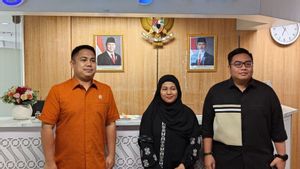JAKARTA - The Indonesia Economic Prospect (IEP) report by the World Bank in June 2022 predicts the Indonesian economy will grow 5.1 percent in 2022 and increase to 5.3 percent in 2023.
In response to this, the government through the Ministry of Finance (Kemenkeu) assessed that the projection was based on several supporting factors, such as increased consumer confidence, a better trade exchange rate, and a restrained surge in demand.
Head of the Fiscal Policy Agency (BKF) of the Ministry of Finance, Febrio Kacaribu, said that the World Bank's outlook is in line with the economic growth range that has been set by the government.
"This indicates that Indonesia's resilience is still maintained amidst increasing global risks," he said in a press statement on Wednesday, June 22.
According to Febrio, the economic recovery will continue despite the increasingly challenging global situation, both due to global inflationary pressures, tightening external monetary policy, and deteriorating global economic conditions.
"After being able to grow 3.7 percent in 2021, the momentum for Indonesia's economic recovery will continue until the first quarter of 2022. Economic growth was recorded quite high at the level of 5.0 percent even though it had experienced an omicron wave," he said.
Furthermore, Sri Mulyani's subordinate emphasized that if the World Bank provided a note of anticipation, it would be necessary if global conditions worsened.
In addition, there is increasing concern over food security insecurity and poverty due to limited supplies and high world food prices.
On the other hand, Indonesia's inflation for the whole year is predicted to reach 3.6 percent or according to the target of 3 percent plus minus 1 percent.
"The ratio of the APBN deficit to Indonesia's GDP is also projected more optimistically by the World Bank at 3.7 percent or better than the new 2022 APBN posture of 4.5 percent. This reflects optimism for better fiscal consolidation," Febrio continued.
To that end, the World Bank identified several areas of structural reform that could be considered or accelerated, including creating greater fiscal space through improved tax administration, improved quality of spending, and better management of subsidies,
"The government appreciates the World Bank, which views that sustainable structural policy reforms can support future economic growth and reduce dependence on short-term macroeconomic stimulus. This is in accordance with the direction of fiscal policy that is designed now and in the future,” concluded Febrio.
The English, Chinese, Japanese, Arabic, and French versions are automatically generated by the AI. So there may still be inaccuracies in translating, please always see Indonesian as our main language. (system supported by DigitalSiber.id)













